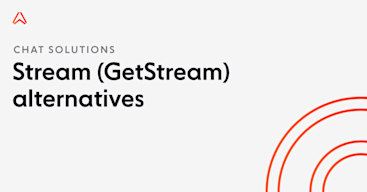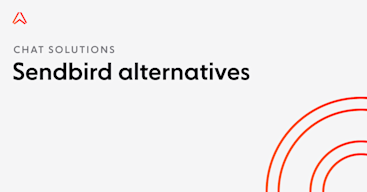- Topics
- /
- Realtime technologies
- /
- CometChat alternatives: 5 competitors to consider in 2024
CometChat alternatives: 5 competitors to consider in 2024
CometChat overview
CometChat is a hosted chat platform as a service (PaaS) that provides APIs, SDKs, and UI widgets to help developers add chat functionality to their apps. In addition to one-to-one and ground chat functionality, CometChat offers voice and video calling, as well as value-add features such as moderation tools, presence indicators, and media attachments.

If you’re looking to add chat functionality to your app and CometChat is one of the options you’re thinking about, make sure you know:
What CometChat does well.
CometChat’s limitations.
The most compelling CometChat alternatives.
First, let’s look at what CometChat offers:
A chat PaaS delivered through an API, as well as SDKs, UI widgets, and UI kits.
One-to-one and group text chat.
Voice and video calling between individuals and for groups.
Moderation tools, such as sentiment analysis, user reporting, and profanity filtering.
CometChat provides SDKs for a handful of mostly mobile platforms and front-end frameworks. In addition to the full SDKs, CometChat’s widgets offer a quick way of embedding chat into web and mobile applications.
CometChat advantages
CometChat’s main advantage is that it can be quick to get started, especially as you don’t need to customize the user experience or functionality on offer.
Widgets require little coding: If you’re happy with a standardized user experience, it’s easy to add chat functionality by pasting CometChat’s widgets into your app’s UI.
Connects with other tools: CometChat’s Extensions Marketplace helps you use the PaaS with a limited selection of other tools and services.
Free to get started: CometChat’s free plan lets you build limited proofs of concept before committing to a paid plan.
CometChat disadvantages
It’s worth thinking about CometChat’s limitations, too, including:
Limited to chat: CometChat is not a fully rounded realtime platform. You can build only chat (including video and voice) functionality using their services.
Support can be slow: Reviews from CometChat customers suggest that responses to support queries take longer than those customers would like.
Limited support for back-end integration: CometChat’s client libraries, such as their Angular and Android SDKs, are designed for front-end usage. There is no SDK for common back-end languages, such as Java and .NET.
5 alternatives to CometChat
There are many alternatives to CometChat, each of which offers a different approach to building chat functionality into web and mobile applications. Here are five of the most popular alternatives to CometChat:
Sendbird
Stream
Twilio Conversations
ArrowChat
Ably
Sendbird
Sendbird, like CometChat, is a platform-as-a-service (PaaS) provider that specializes in chat. It offers an API, SDKs, and UI kits to help you to build support, marketing, and transactional live chat experiences without needing to create the underlying functionality from scratch.

Sendbird advantages
Use case specific APIs: Sendbird focuses on chat, video, and notifications, offering additional functionality including moderation, reactions, mentions, typing indicators, user presence, and read receipts. It also offers specialized versions of those tools for support scenarios.
Scales: Sendbird claims that it can scale well, citing more than a million active users per client application.
Regulatory compliance: Sendbird is registered as complying with standards such as SOC 2, ISO 27001, HIPAA/HITECH, and GDPR.
Sendbird disadvantages
If you’re considering Sendbird then make sure you’re aware of some of its downsides, too:
Focused on chat: Sendbird can help you build chat and activity feeds in just the way its product and engineering teams planned. To build things slightly differently or to serve other use cases, such as realtime collaboration, you’ll need to use another platform.
Limited to one data center: Sendbird has multiple data centers but you’ll need to choose just one for your application. That can lead to a reduced user experience for people who are a long way from that data center.
SDKs for a limited set of languages: Sendbird’s SDKs are available for some major languages but not for common ones such as Java, Python, PHP, Go, and Ruby.
Stream (formerly GetStream)
Stream is similar to CometChat in that it is a PaaS dedicated to chat. Stream offers SDKs and APIs to build chat functionality directly into your app. It has also recently introduced activity feeds alongside chat functionality, with plans to add video and voice calling, too.

Stream advantages
Made for chat: Stream is dedicated to chat. Each API, SDK, and widget is built to make it easy to add chat to your product.
Reliable enterprise plans: If you’re on Stream’s highest package they offer a five nines uptime guarantee. However, the SLA is lower if you are on one of the less expensive plans.
Managed infrastructure: Stream handles your chat functionality’s backend albeit from just one of its data centers around the world.
Stream disadvantages
Only offers chat and activity feeds: Like CometChat, Stream’s offering is limited to certain use cases. If you need to build other realtime functionality, such as data broadcast or realtime collaboration, then you’ll need to integrate with another solution.
Not flexible: Even if all you want to build is chat, you are limited to the version of that functionality designed and delivered by Stream.
Stream stores your data: Data doesn’t just pass through Stream’s servers, but it gets stored there, too. That could be an issue for customer privacy, as well as compliance with regulations.
Twilio Conversations

Twilio is most famous for its SMS and phone calling APIs but they also offer a product for one-to-one chats called Twilio Conversations. Is it right for your needs?
Twilio Conversations advantages
Works across multiple channels: Twilio Conversations isn’t limited to just web chat, it can work with WhatsApp, Facebook Messenger, and SMS, amongst others.
Send videos and images: Rich media is important to many conversations, such as sending customer support a photo of a broken item. Twilio Conversations supports sending images, videos, and other files.
Standards compliant: Twilio Conversations is compliant with industry standards such including ISO 27001, HIPAA, GDPR, SOC 2.
Twilio Conversations disadvantages
Limited feature set: Twilio Conversations works well in support and customer service scenarios. But it lacks some common features, such as public group chat, mentions and reactions.
Just one data center: Twilio Conversations does not have a global, edge architecture. That will compromise performance for users who are not close to the data center you choose and could lead to a single point of failure.
Inflexible: If you need something more than customer service chat, Twilio Conversations might not be right for you. For example, if you need other realtime functionality or to build a more customized chat solution, then you’ll need to use another platform.
ArrowChat
ArrowChat is a JavaScript chat widget that gives you two ways to manage your chat backend. One option is self-hosting. That involves running ArrowChat’s PHP backend code on your own server. There’s a limited free version or you can pay a one-time fee to access additional features, such as file sharing and moderation.
The alternative is to pay a monthly fee to use ArrowChat’s hosted service, known as ArrowChat Push.
There are two advantages to choosing the hosted service:
There’s less to manage: Running your own chat backend gives you freedom over where you host the service and keeps chat data under your control but it will take time away from other tasks.
It should be more scalable: The self-hosted version of ArrowChat relies on manual HTTP polling to update the chat widget. The hosted version uses WebSockets, instead, which should enable you to provide a better service to more chat users simultaneously.
However, both versions of ArrowChat are substantially limited in comparison to CometChat.
ArrowChat advantages
Low set-up costs: With the self-hosted version, you can start for free or pay a low one-off fee plus your ongoing hosting fees for the backend.
Quick to get started: Adding the ArrowChat widget to your website or web app is simple, as you just need to add a few lines of JavaScript to your frontend. If you choose the hosted service, then there isn’t a great deal more to do. Setting up the self-hosted version will take more initial effort and ongoing maintenance. As we see in the disadvantages section, the story is more limited if you need to offer chat in a mobile app.
Integrates with common PHP tools: As part of the PHP ecosystem, ArrowChat has ready made integrations with tools such as Drupal and WordPress.
ArrowChat disadvantages
Not ideal for large scale projects: Whether you’re using the self-hosted or hosted version of ArrowChat, it will struggle once you hit a relatively small number of users. The ArrowChat website warns that the self-hosted version can support fewer than a thousand users. While the hosted version should perform better, thanks to WebSocket, even the enterprise version tops out at 2,000 concurrent users.
Limited mobile support: ArrowChat uses a cross platform framework (Onsen UI) to offer mobile support, rather than native iOS and Android SDKs, or even more popular cross-platform frameworks such as React Native.
Support might not meet business needs: Unlike the other CometChat alternatives we’re reviewing, ArrowChat is built by a single person. That means that ArrowChat does not have a dedicated support team. Reviews suggest that impacts support quality.
Ably, the best CometChat alternative for global, scalable, realtime chat experiences
Ably is a realtime experience infrastructure provider. Our APIs and SDKs help you power realtime functionality for use cases like live chat, multiplayer collaboration, and data broadcast, without having to worry about managing and scaling messy realtime infrastructure.

Ably's network
Our globally-distributed, multi-region network offers unrivalled guarantees around performance, data integrity, reliability, and scalability:
<50 ms median latency.
Guaranteed message ordering and (exactly-once) delivery, even in unreliable network conditions.
Redundancy at regional and global levels, with a 99.999% uptime SLA.
Dynamic elasticity, with the ability to send billions of messages to millions of channels and chat users.
Ably Chat
Our new product, Ably Chat, is designed to deliver a great chat experience for use cases from livestreams and in-game communication to customer support and social interactions in SaaS products.
It comes with purpose-built APIs for quickly building out chat features, including realtime messaging, online status and presence tracking, typing indicators, and room-level reactions.
Built on Ably's core platform, Ably Chat streamlines the complexities of realtime chat architecture, providing a powerful and flexible solution for a wide range of use cases. Here’s how it benefits you:
Composable realtime: Unlike chat-specific products or building your own solution from scratch, Ably offers the best of both worlds - full flexibility to build what you want, and quickly.
Dependable by design: We’ve built a realtime experience platform engineered for predictable latencies, ensuring uninterrupted service, capacity and availability across regional and global levels, even at extreme scale.
Cost optimizations: Our flexible pricing model—offering customizations like hourly billing, usage-based pricing, and volume discounts—is tailored for operations at scale. And soon, upcoming features like batching and aggregation will help keep costs low.
We have client SDKs for every major programming language and development platform, and we offer a wide variety of integrations, so you can easily connect Ably to your preferred tech stack.
Build chat experiences you can trust to deliver at scale
Sign up for a free Ably account, and check out our chat apps reference guide to get started.
Recommended Articles

Stream (GetStream) alternatives: 5 competitors to consider in 2024
Discover the best solutions you can use instead of Stream to build web-based and in-app chat experiences.

Sendbird alternatives: 9 competitors to consider in 2024
Discover the nine best solutions you can use instead of Sendbird to build web-based and in-app chat experiences.